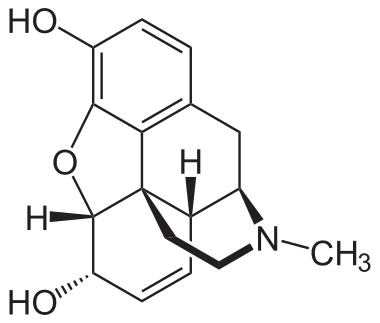Opioid facts for kids
Quick facts for kids Opioid |
|
|---|---|
| Drug class | |

The shape of morphine, a common opioid.
|
|
| Class identifiers | |
| Use | Pain relief |
| ATC code | N02A |
| Mode of action | Opioid receptor |
| Legal status | |
Opioids are a group of medicines that come from, or act like, natural substances found in the opium poppy plant. These medicines work in your brain to help with different things, especially pain. They connect with special parts in your brain called opioid receptors to create effects similar to morphine.
Sometimes, people use the words 'opioid' and 'opiate' to mean the same thing. However, there are small differences based on how these medicines are made.
Doctors mainly use opioids to help with pain relief, including during anesthesia (when you are put to sleep for surgery). They can also be used to stop diarrhea and to calm a cough. Some very strong opioids, like carfentanil, are only used for animals. Opioids are very powerful and must be used with great care.
Opioids can have side effects. These might include itchiness, feeling sleepy, nausea (feeling sick to your stomach), slowed breathing, constipation, and a feeling of happiness. If someone uses these medicines for a long time, their body might get used to them. This means they would need more of the medicine to get the same effect. Also, if they stop taking the medicine suddenly, they might feel unwell. Taking too much of an opioid or mixing it with other medicines that make you sleepy can be very dangerous because it can make breathing stop.
Because opioids are strong medicines and need to be used carefully, most of them are controlled substances. This means they are special medicines that doctors need to prescribe and watch closely.
Contents
How Opioids Are Used in Medicine
Helping with Pain
A milder opioid called codeine is often found in prescription medicines, and sometimes even in medicines you can buy without a prescription, to help with mild pain. Other opioids are usually kept for pain that is more serious.
Short-Term Pain
Opioids are good at treating pain that lasts for a short time, like pain after surgery. For quick relief of moderate to serious short-term pain, doctors often choose opioids. This is because they work fast and are very effective. They are also important in palliative care, which helps people with serious, long-lasting pain from conditions like cancer or rheumatoid arthritis. For people with long-term cancer pain, opioids can be a successful way to manage their pain.
Long-Term Pain Not from Cancer
Experts suggest that for most long-term pain that is not from cancer, like headaches, back pain, or fibromyalgia, the risks of opioids might be greater than their benefits. So, doctors should be very careful when using them for these types of pain. If they are used, doctors should check if they are still helping and if there are any problems at least every three months.
Helping with Coughs
Codeine was once thought to be the best medicine for coughs, but doctors are now questioning this. It is not suggested for children.
A small amount of morphine might help with long-lasting coughs, but it can have side effects.
Helping with Diarrhea
For some types of irritable bowel syndrome where diarrhea is the main problem, opioids might be used to stop the diarrhea. Loperamide is an opioid medicine you can buy without a prescription that helps stop diarrhea. It works mainly in the gut.
Helping with Shortness of Breath
Opioids may help people who feel short of breath, especially in advanced illnesses like cancer and COPD. However, some studies have shown that opioids might not always be more helpful than other treatments for shortness of breath in people with advanced cancer.
Possible Side Effects
Opioids can cause different side effects.
Common and Short-Term Effects:
- Itching
- Nausea (feeling sick to your stomach)
- Vomiting
- Constipation
- Feeling drowsy
- Dry mouth
Other Effects:
- Feeling dizzy
- Loss of appetite
- Feeling sad
- Increased risk of falls
- Slowed breathing
It's important to know that opioids are very strong medicines. They must be used exactly as a doctor tells you to.
Types of Opioids
Natural Opium Substances
These are substances found naturally in the opium poppy:
Sometimes, mixtures of these natural substances, like papaveretum, are still used.
Man-Made Opioid Medicines
These are made from natural substances but are changed in a lab:
- Buprenorphine
- Etorphine
- Hydrocodone
- Hydromorphone
- Oxycodone (known as OxyContin)
- Oxymorphone
Opioid Blockers
These medicines work to block the effects of opioids. They are often used in emergencies if someone has taken too much opioid medicine.
- Nalmefene
- Naloxone
- Naltrexone
- Methylnaltrexone (This one mostly works outside the brain.)
- Naloxegol (This one also mostly works outside the brain.)
See also
In Spanish: Opioide para niños
 | Delilah Pierce |
 | Gordon Parks |
 | Augusta Savage |
 | Charles Ethan Porter |

